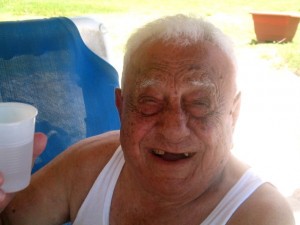Posts Tagged ‘Jamaica’
Remembering Uncle P. – A Tribute
I don’t know how to do it.
I don’t know how to understand a world that no longer has Uncle Pethro in it.
It’s not that I’m overwhelmed with grief at his passing. Losing my mother eight years ago shifted my perspective on death and dying. So, I am sad, I am heartbroken, I am bereft, but I am not in pieces.
Still, the journey of saying a final goodbye to someone who has been a constant fixture in my life is difficult. Coming to terms with the impact his loss has on others is even more fraught with emotions.
The formal obituary tells the story of Uncle Pethro’s life and outlines the legacies of his accomplishments, achievements, and successes. It pays tribute to his extended and extensive family and honours the woman who stood by his side over six decades, matching him stride for stride over the years, my Aunt Madge.
But who was this man to me?
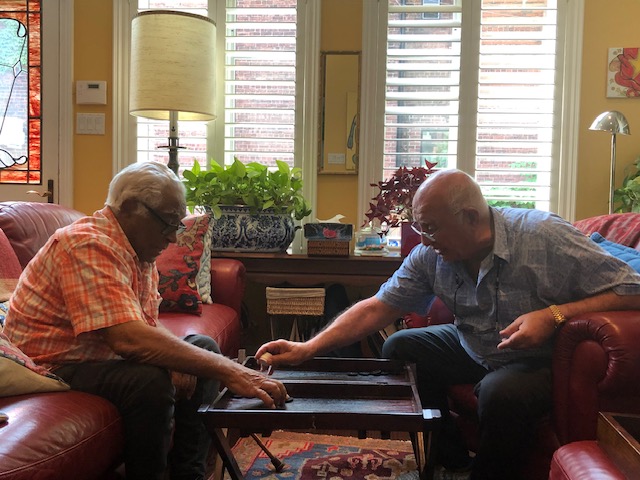
My mother’s first cousin and one of her best friends. Uncle Pethro and my mom shared a bond that helped each of them triumph over the reality of being outsiders. Others consigned them to the margins. They asserted their right to be at and in the centre. They made sure they were seen, heard, and recognized without compromising what they stood for and who they wanted to be. They did not accept the spaces others relegated them to and forged their own paths, carved out more imaginative lives, lived bigger stories than the ones others wrote for them.
Uncle Pethro was the man who would say, “Let me look at you!” even if you were standing right in front of him. He didn’t just want to see the face you presented to the world, he wanted to see the essence of who you were on the inside.
He was also the man with the all-consuming embrace. The man whose arms would wrap around you and make you feel protected, invincible, and treasured.
He was the man whose voice echoed in the room, whose voice was deep, resonant, and full. And — I say this with love — it’s a voice you heard often and at length because he loved to pontificate! He wanted to dig out the complexities of life, to talk about its nuances, to sort out its chaotic randomness at the same time that he could be rude, crude, and indelicate.
He was the man who had a pride of place. He loved Jamaica, the land of his birth, in all its contradictions, even if it was the home he had to leave to find the space to be free and to become the man he wanted to be.
He was generous, caring, and thoughtful, opening his doors, at home and at work, to a diversity of folk. He and Aunt Madge entertained well and often, and they set a standard as hosts that is difficult to achieve, and essential to emulate.
We all forgave Uncle Pethro his bombastic nature because underneath it all beat a passionate, life-full, and cheery heart.
Until it didn’t.
Ultimately, it was Uncle Pethro’s body that stopped working with him and started to work against him, that whittled away at him.
He was stalwart throughout each health crisis that battered him. His physical strength and mental toughness, along with Aunt Madge’s love, diligence, and care, carried him further and for longer than seemed possible.
When I moved to Toronto in 1986, Uncle Pethro and Aunt Madge welcomed me into their home and made sure I never felt alone in the vastness of the city or lost in the gulf of the choice I had made when I left home.
They saw me through the ups and downs of my time in that city, celebrated with me when things went well and consoled me when they did not. We shared food, drink, and conversation. We built a bond that transcended the familial connection. That feeling of being a part of each other’s lives became even stronger after I returned to Vancouver and our visits, because of the distance, became occasional rather than frequent.
Having spent the last few days in Toronto with Aunt Madge and the family, I’ve been reflecting on the past and ruminating on the future. Now I’m sitting here in seat 2B on Porter Air, Flight 309, surrounded by strangers, high above the clouds, and anxious to get home. I’m trying to make the pictures in my mind, of the vibrant, vital person I knew and loved, more animated and I’m fighting the way I feel that they are blurring and ebbing already. I’m trying to understand this new world that has lost that singular gravelly voice, that strong embrace, that hearty appetite, that appreciation for beauty, and that gift of laughter.
It’s not about making a saint out of my Uncle Pethro or remembering him as a paragon of virtue. It’s about knowing to love him as the man that he was.
Because if there’s anything I’ve learned from the years of being in Uncle Pethro’s company, is that to be human is divine even if we are flawed and our lives are finite.
To understand this world without Uncle Pethro is to understand that it was better with him in it, and that it will still be good because he was once a part of my mornings and my days, my nights, my years, my joys and my sorrows.
I will remember him.
Rest in peace Uncle Pethro.
Walk good.
Fragments of a Whole Being Belonging
I belong to Air Canada.
In this moment. January 2020.
Buckled into Seat 14C.
Far above where birds take flight. The place where dreams alone can live.
In this moment, I belong to this unbounded world above the clouds. A creature of the air.
This air-borne liberation is a mirage.
I know my feet belong on the ground. A creature of the earth.
I am on a flight to Montreal to visit friends. Their relocation to this city will bring me back again and again because our friendship is long standing and we will nurture it. My friends have also made me belong to Montreal again.
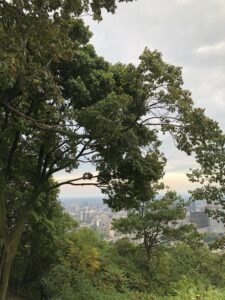
Again, because this is the city where my parents met. Where I was born, but never lived in for long. What part of me, then, belongs here? Belongs to this city where I speak the language only to a moderate level of fluency? Because all of me would not be if it weren’t for this city.
But countries and cities pull at me from all different directions.
Jamaica – my mother’s birthplace. Lebanon – my father’s. Kuwait – where my sister was born. Calgary – where my youngest sister was born. And Vancouver where we settled in 1974 and where my family has stayed since. All of us have ventured afar over the years, whether alone or together, to travel or to live for fragments of time. Toronto – where I lived for six years.
My whole being is a mosaic of spaces, places, and time. Of different cultures and societies. I identify with all of them and I identify with none of them. I am rooted in my experiences with each and am unrooted because I do not feel like I wholly belong in any of them.
They have all shaped me as have other cities I’ve visited, especially those that feel as if they are the locations where I ought to be, where I yearn to be.
In Montreal, my friends and I go to a movie they want to share with me. Their second viewing, my first.
Antigone (in French, Canada, 2019). Sophie Deraspe’s screenplay and her direction. Based on the Ancient Greek play by Sophocles. A play I know. A play that belongs to me because I have studied it, absorbed it, discussed it, taught it, remember it.
This film, this Antigone, which now belongs to me, too, tells the story of an immigrant family to Canada. Two girls, two boys, and a Grandmother, haunted by the memories of the children’s parents murdered in Algeria, in the country that they once belonged to.
In this country, this foreign Canada, do they belong?
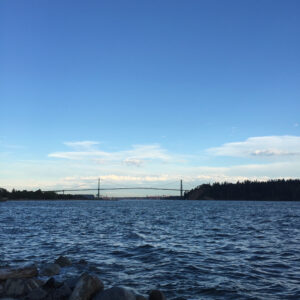
Ismène, the older girl, has built a successful career as a hair stylist. The grandmother cooks, cleans, loves each child ferociously. Antigone is fearlessly devoted to the family, to their story, to their truth. In an address to her class, “une exposition,” she elevates her classmates from a state of boredom, heads on the desk, eyes rolling, to whip-straight postures, eyes that pierce through teenage school inertia. Her story of survival, loss, and grief lures them to listen.
Antigone’s two brothers? Étéocle and Polynice? The fierce family love envelops the two brothers and yet they search for belonging elsewhere.
Why isn’t their family enough?
And why do men so often find belonging in violence, especially vulnerable men?
The story of this dislocated, relocated family unravels in flashbacks and in real time. Antigone’s knowledge of her brothers, the appearance of their being and belonging, is contradicted by the reality she grasps in hindsight.
She remembers a night. Polynice creeps home late, after dark. He opens the fridge door, she startles him in the kitchen. He stands in the shadows, the pale light casting an eerie halo around him. Bruised, bloodied, black-eyed, he exults to his sister “I’m in,” “I’m in.”
In what? In toxic brotherhood? In a position to provide for his family now? In hopelessness? In power? In control, as illusory as that power and control may be?
Polynice is not a lone wolf. What he decides matters. It affects him, his brother, his sisters, his grandmother, his community. But he makes choices as if he were alone. Is his choice a resistance to belonging to this family or is it his way to belong more meaningfully?
His choice is made as if he were an island. But no person is an island.
As much as we may long for separation, for isolation. Long to escape duties, obligations, chores, stress, news, disasters, worries, fears. But a hermetic existence is possible for only a few, it is life’s answer or life’s purpose for even fewer.
Most of us, the vast majority, need – crave – connection. We are social creatures. Socialized creatures. We achieve our potential by being a part of a world wide web and I do not mean losing ourselves in the emptiness of cyberspace or discarding hours of our life on the internet.
We want to belong. We are part of a world of belonging.
We recognize that we are as others are. Lost, found, lonely, together, alive, dying, needy, giving, angry, happy, sad, joyful, cruel, kind, hateful, loving, powerful, powerless, smart, stupid, healthy, sick, caring, selfish, playful, serious, studious, ignorant, ambitious, lackadaisical, safe, unsafe, privileged, oppressed, worried, carefree, careful, careless, faithful, faithless, believing, unbelieving. Free, not free.
Isolation, being alone, is a desire, a fantasy, as is belonging. The former is a choice, the latter inescapable. We are compelled into connection. We are born into a web of connections.
We have to negotiate with ourselves as much as with others. We negotiate with life, with experiences. And despite this we are often unprepared for what life throws at us.
Perhaps there is a toxic underpinning to the idea of belonging. After all, embedded in the word “belong” is the idea of ownership. My husband, my wife, my spouse, my daughter, my son, my child, my father, my mother, my parents, my sister, my brother, my siblings, my niece, my nephew, my uncle, my aunt, my grandparents, my cousins, my relatives, my friend, my colleague, my acquaintance, my pet, my community, my neighbourhood, my job, my school, my work, my career, my money, my dreams, my aspirations, my humour, my loss, my grief, my beliefs, my body, my pain.
Would we be better served by leaving belonging to refer to objects? When we talk about humans, living creatures, plants, trees, the earth and the webs of existence in which we’re enmeshed, would it be better use other verbs: “connect,” “embrace,” “cherish,” “know,” “love”? I connect with this city; this city connects with me. This family embraces me; I embrace this family. These friends cherish me; I cherish these friends. I know that person; that person knows me. You love me; I love you.
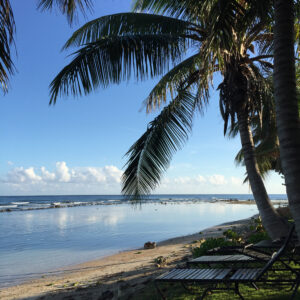
Words alone will not remake belonging. We need to excavate the purpose, the meaning, the appeal, the allure, the temptation of belonging.
Why do we care about belonging? Why do we need to belong?
Where do we belong? To whom do we belong?
Where do I belong? To whom do I belong? Who belongs with me, to me?
I think we can only remake belonging if we learn to transcend the boundaries of belonging and not belonging. To embrace the ambiguity and uncertainty of embodying different states and ways of being. To be unbounded. To imagine our lives as bigger than what we can see, hear, touch, taste, and smell. Bigger than our dreams, bigger than our imaginations.
Bigger than our communities of “same as me.”
As big as our hearts.
Because we belong nowhere and everywhere.
I belong nowhere and everywhere.
I may live in Vancouver, but fragments of me are dispersed. Unless I identify with everywhere, I can’t care about the world, the environment, the fragile state of humanity’s existence.
We belong to nothing and everything.
I belong to nothing and everything.
Because I am not beholden or enthralled by a particular thing or person and yet I am curious about all the world has to offer.
We belong to no one and everyone.
I belong to no one and everyone.
Because I am not an object to be owned and yet I am human as you are human, as he is human, as she is human, as they are human, as the many are human.
This heart belongs to those I love, but not as a thing for them to own.
It is a gift that says they are valued and valuable.
This soul is untethered in a state of un-belonging.
The essence of me is free.
Remembering
My maternal grandfather, Mr. Mike as he was known, passed away in 2008 at the age of 104. Yesterday, October 9th, would have been his birthday. These are the words I spoke at his funeral four years ago.
“As you can see, I’ve written a book. But, before I start, let me say one thing. Looking around at this incredible gathering, the one person I know who’s having the time of his life, wherever he may be, is Michael Khaleel George Azan.
My name is Reema and I’m Mr. Mike’s granddaughter. My mother is Y., Miss U as she’s known in Spaldings.
I hope, as C. and I speak, you’ll hear the echo of the many voices speaking with us today, the voices of all Mr. Mike’s grandchildren and great-grandchildren.
When I asked my 7-year old son what he remembers most about Grandpa Mike, he answered: “He was very old and he sat a lot.”
I know how lucky my son is to have known his great-grandfather well enough to have memories of him.
But I’m sad he didn’t know Mr. Mike the way my cousins and I did.
Mr. Mike, until recently, was not a guy who sat a lot: he loved to move, he was loud, he was vivacious, passionate, strong, loud, he loved to travel, he was loving, full of energy, brimming with confidence, and … loud.
Grandpa Mike was a force of nature and it seems only fitting that we remember him today, September 10th, which I’ve read is the peak day of hurricane season.
He was a man of the earth. Born in Lebanon and living in poverty, he once told me he “walked four year barefooted.” His footprints are embedded in the very soil of our world: in Europe as he made his way to his new island home in 1922, in Jamaica – his home for 86 years, or in Canada and the United States where he visited family.
He was a man who enjoyed the bounty of the earth. If there ever was a man who gloried in the pleasure of food – and was deeply thankful for every mouthful – it was Mr. Mike.
In the morning, he would have a glass of water, a cup of hot strong coffee and two bananas. And that was before breakfast. My cousin D. remembers him in the kitchen, in his white undershirt, mixing Fatoosh, a Lebanese salad, in a huge aluminum bowl to feed members of the family who would gather around the tables set end to end to accommodate everyone.
On Friday nights, Uncle V.’s family would travel up to Spaldings for dinner. V.’s son remembers how Grandpa Mike made him feel special by making sure that even as a child he was included in the conversation.
It was that ability to make people feel special that made Grandpa Mike such an expert salesman, or as my cousin G. says, “he could sell water to a fish in a pond”.
No one who knew Mr. Mike could deny that he had fire in him. You know that if there was music, it wouldn’t be long before he’d get up to dance.
At his 100th birthday celebration, my sister remembers how his eyes twinkled as he watched a belly dancer perform. When he tried to join her, his children urged him to remain seated. He shrugged them off, got up to dance, twirling his white handkerchief around and around.
Mr. Mike loved his family fiercely, and he had a temper, one that chased many a customer out of his store.
I remember visiting Jamaica as a young girl of 11 and being utterly fascinated by the store. I remember it as a dim cavern of treasures: men’s fabrics, women’s fabrics, cotton panties, housewares, lace, thread, mixing bowls, brooms, ribbon, and buttons.
My favourite part of the store was the mezzanine where there were boxes and boxes of shoes, some easily twenty years old.
I remember the magic of the place: it was a dragon’s den and Mr. Mike was the fire-breathing guardian. He used his voice to bellow his disapproval, and my cousin D. remembers that he also used brooms, pots and pans, and even shoes which he threw down the street after the people running away.
Mr. Mike was so physically strong. My cousin L. remembers his “hugs were so tight you thought he broke a rib and the kisses that were so hard, I swore his beard cut my face open.”
He was also a man of beliefs. The essence of his philosophy, as described by my cousin S., was his love of God, his love of family, and his love of friends.
I believe that part of Mr. Mike’s longevity was his innate curiosity about the world and an appreciation for all the things in it. This is a man who had no formal learning, but he was always asking questions.
And he never seemed to forget a thing. I once asked him to tell me about Spaldings when he first arrived. According to the notes I made, here’s some of what he told me: “Eggs was 6 pence a dozen, meat was 6 pence a pound. A big loaf of bread was 9 pence. 9 pence was money.”
Earth. Fire. Air. These, according to ancient philosophers, are considered the principal elements of nature along with water. I like to think of life as a river. You’ve got to jump in and go with the flow.
Most of us are tempted to reach out and grab a branch or a log to get to safety. Not Mr. Mike.
I believe he was fully immersed in the river of life and trusted the current to carry him.
The word hero is thrown around a lot in our world. But sometimes I think the most extraordinary people amongst us, the true heroes, are those like Mr. Mike, who live in contentment, who take joy in their family and friends, and who work on behalf of their community. Who ride the ups and downs of life, who take the good with the bad, and who smile every day.
Mr. Mike used his voice to share his stories with all of us. Sadly, we’ve lost that voice. He didn’t have the ability to capture those stories with words on a page, but he had pictures. He was obsessive about pictures. I think that’s because they were his diary, his journal, his testament. He could look at them and say: “I’m a good man. I’ve lived a good life. These are the ones I love and this is my life’s work.”
We are his life’s work: his children, his grandchildren, his great-grandchildren. And to him we were – we are – masterpieces. Flaws and all. And, if we’re smart enough, and if we love enough, as we go about our daily lives, we will hear the echo of his footsteps, the echo of his voice, and we will feel the echo of his arms around us, and the echo of his heartbeat, here, inside each and every one of us.”
